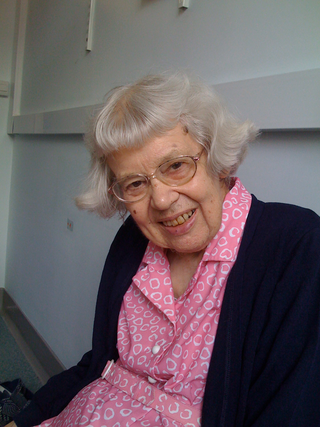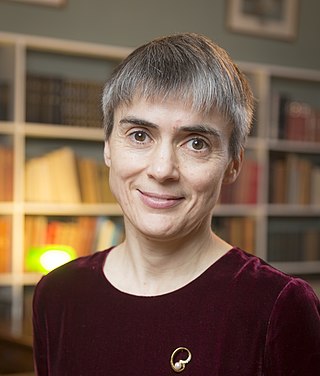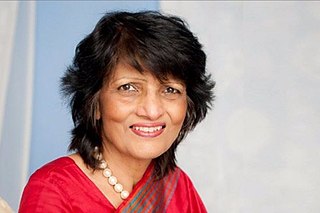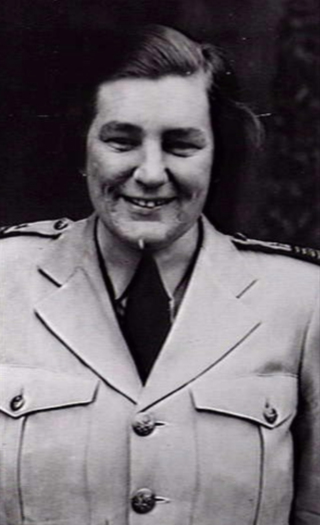
Mary Frances Lyon was an English geneticist best known for her discovery of X-chromosome inactivation, an important biological phenomenon.
Deborah Charlesworth is a population geneticist from the UK, notable for her important discoveries in population genetics and evolutionary biology. Her most notable research is in understanding the evolution of recombination, sex chromosomes and mating system for plants.

Ruth Sager was an American geneticist. In the 1950s and 1960s she pioneered the field of cytoplasmic genetics by discovering transmission of genetic traits through chloroplast DNA, the first known example of genetics not involving the cell nucleus. The academic community did not acknowledge the significance of her contribution until after the second wave of feminism in the 1970s. Her second career began in the early 1970s and was in cancer genetics; she proposed and investigated the roles of tumor suppressor genes.
Sir Otto Herzberg Frankel FRS FAA FRSNZ was an Austrian-born New Zealand and Australian geneticist. In the 1960s and 1970s he was among the first to warn of the dangers of plant biodiversity loss.

Mary-Claire King is an American geneticist. She was the first to show that breast cancer can be inherited due to mutations in the gene she called BRCA1. She studies human genetics and is particularly interested in genetic heterogeneity and complex traits. She studies the interaction of genetics and environmental influences and their effects on human conditions such as breast and ovarian cancer, inherited deafness, schizophrenia, HIV, systemic lupus erythematosus and rheumatoid arthritis. She has been the American Cancer Society Professor of the Department of Genome Sciences and of Medical Genetics in the Department of Medicine at the University of Washington since 1995.

Lorna Ann Casselton, was a British academic and biologist. She was Professor Emeritus of Fungal Genetics in the Department of Plant Science at the University of Oxford, and was known for her genetic and molecular analysis of the mushroom Coprinus cinereus and Coprinus lagopus.
Mary Styles Harris is an American biologist and geneticist, president of Harris & Associates in Atlanta, Georgia, and owner of BioTechnical Communications, which produced the television documentary "To My Sister...A Gift for Life."

Dame Henrietta Miriam Ottoline Leyser is a British plant biologist and Regius Professor of Botany at the University of Cambridge who is on secondment as CEO of UK Research and Innovation (UKRI). From 2013 to 2020 she was the director of the Sainsbury Laboratory, Cambridge.
Jennifer Ann Marshall Graves is an Australian geneticist. She is Distinguished Professor within the La Trobe Institute for Molecular Science, La Trobe University, Australia and Professor Emeritus of the Australian National University.
Patricia Verne Kailis was an Australian business woman, geneticist and neurologist noted for her work in genetic counseling for neurological and neuromuscular disorders.
Katherine Wilson is a molecular biologist and a marine scientist. She is also the executive director of the science division at the Office of Environment and Heritage (OEH), New South Wales. Wilson is responsible for the delivery of OEH's science program, which provides technical analysis, expert advice and research to support the NSW government's policy and program objectives in environmental management. As a member of the OEH Executive, Wilson guides delivery of services ranging from energy efficiency programs to management of national parks. Wilson is also a Board Member of the Low Carbon Living Cooperative Research Centre and Chair of the External Advisory Committee, Australian Rivers and Wetlands Centre, University of New South Wales.
Pamela Soltis is an American botanist. She is a distinguished professor at the University of Florida, curator at the Florida Museum of Natural History, principal investigator of the Laboratory of Molecular Systematics and Evolutionary Genetics at the Florida Museum of Natural History, and founding director of the University of Florida Biodiversity Institute.

Katherine Belov is an Australian geneticist, professor of comparative genomics in the School of Life and Environmental Sciences and Pro Vice Chancellor of Global Engagement at the University of Sydney. She is head of the Australasian Wildlife Genomics Group and research expert in the area of comparative genomics and immunogenetics, including Tasmanian devils and koalas, two iconic Australian species that are threatened by disease processes. Throughout her career, she has disproved the idea that marsupial immune system is primitive, characterized the South American gray short-tailed opossum's immune genes, participated in the Platypus Genome Project, led research identifying the properties of platypus venom, and identified the cause of the spread of the Tasmanian devil's contagious cancer.

Meena Upadhyaya OBE, FRCPath, FLSW is an Indian-born Welsh medical geneticist and a Professor emerita at Cardiff University. Her research has focused on the genes that cause various genetic disorders, in particular neurofibromatosis type I and facioscapulohumeral muscular dystrophy.

Dame Margaret Blackwood was an Australian botanist and geneticist. She attended the University of Melbourne and lectured there for the majority of her career, becoming deputy chancellor after her academic retirement. She was appointed Dame Commander of the Order of the British Empire in 1981 and was inducted posthumously into the Victorian Honour Roll of Women in 2001.
Jenefer Blackwell is a Professor of Molecular Parasitology at the Telethon Kids Institute in the University of Western Australia. She studies host susceptibility and resistance to infectious diseases.
Margaret M. Perry (1930-2009) was an English molecular geneticist and embryology researcher at the University of Edinburgh whose research produced the first warm-blooded animal developed completely in vitro.

Grant Robert Sutherland is a retired Australian human geneticist and celebrated cytogeneticist. He was the Director, Department of Cytogenetics and Molecular Genetics, Adelaide Women's and Children's Hospital for 27 years (1975-2002), then became the Foundation Research Fellow there until 2007. He is an Emeritus Professor in the Departments of Paediatrics and Genetics at the University of Adelaide.
Lyn Robyn Griffiths is an Australian academic who serves as Distinguished Professor of molecular genetics at Queensland University of Technology, where she is director of the Centre for Genomics and Personalised Health, the Genomics Research Centre and the BridgeTech Programs. Griffiths is internationally renowned for her work in the discovery of the genetics of migraine headaches.
Jane Melville is an Australian herpetologist at Museums Victoria. Her research focuses on the taxonomy and genetics of reptiles and amphibians.








